Traci Burch is assistant professor of political science at Northwestern University and research professor at the American Bar Foundation. She is a coauthor of Creating a New Racial Order.
The University of Chicago Press, Chicago 60637
The University of Chicago Press, Ltd., London
2013 by The University of Chicago
All rights reserved. Published 2013.
Printed in the United States of America
22 21 20 19 18 17 16 15 14 13 1 2 3 4 5
ISBN-13: 978-0-226-06476-5 (cloth)
ISBN-13: 978-0-226-06493-2 (paper)
ISBN-13: 978-0-226-06509-0 (e-book)
DOI: 10.7208/chicago/9780226065090.001.0001
Library of Congress Cataloging-in-Publication Data
Burch, Traci R., 1979
Trading democracy for justice : criminal convictions and the decline of neighborhood political participation / Traci Burch.
pages. cm.(Chicago studies in American politics)
ISBN 978-0-226-06476-5 (cloth : alk. paper)ISBN 978-0-226-06493-2 (pbk. : alk. paper)ISBN 978-0-226-06509-0 (e-book) 1. Criminal justice, Administration ofSocial aspectsUnited States. 2. African AmericansSuffrage. 3. Political participationUnited States. 4. PrisonersSuffrageUnited States. 5. Prisoners familiesSuffrageUnited States. I. Title. II. Series: Chicago studies in American politics.
HV9950.B867 2013
364.60973dc23
2013001977

This paper meets the requirements of ANSI/NISO Z39.48-1992 (Permanence of Paper).
CHICAGO STUDIES IN AMERICAN POLITICS
A series edited by Benjamin I. Page, Susan Herbst, Lawrence R. Jacobs, and Adam Berinsky
Also in the series:
Changing Minds or Changing Channels? Partisan News in an Age of Choice by Kevin Arceneaux and Martin Johnson
The Politics of Belonging: Race, Public Opinion, and Immigration by Natalie Masuoka and Jane Junn
Political Tone: How Leaders Talk and Why by Roderick P. Hart, Jay P. Childers, and Colene J. Lind
The Timeline of Presidential Elections: How Campaigns Do (and Do Not) Matter by Robert S. Erikson and Christopher Wlezien
Learning While Governing: Expertise and Accountability in the Executive Branch by Sean Gailmard and John W. Patty
Electing Judges: The Surprising Effects of Campaigning on Judicial Legitimacy by James L. Gibson
Follow the Leader? How Voters Respond to Politicians Policies and Performance by Gabriel S. Lenz
The Social Citizen: Peer Networks and Political Behavior by Betsy Sinclair
The Submerged State: How Invisible Government Policies Undermine American Democracy by Suzanne Mettler
Disciplining the Poor: Neoliberal Paternalism and the Persistent Power of Race by Joe Soss, Richard C. Fording, and Sanford F. Schram
Why Parties? A Second Look by John H. Aldrich
News That Matters: Television and American Opinion, Updated Edition by Shanto Iyengar and Donald R. Kinder
Additional series titles follow index
Preface
I grew up in a small city, Macon, Georgia, which is located in Bibb County. In my lifetime, Macon has declined significantly, like many cities. Its population is lower than it was in 2000. Most of the jobs and white people have left: Macon is 65 percent black, and the poverty rate is 31 percent. Things were so bad in Macon that this year, the city and county had to consolidate in order to keep basic services running.
My father works for one of the only booming businesses in town: the county jail. Over the last ten years the county jail has doubled in capacity, housing more than one thousand inmates. Thats just big enough to hold about 1 percent of the adult population of the county at any given point. And it does seem like lots of people pass through the county jail at some point. It seems like my dad knows almost everyone in town, usually because of his work.
Obviously, my background contributes to my interest in criminal justice. Coming from a place like Macon, one cannot help but care about the young people who have no opportunities, no jobs, and no prospects other than death or prisons. And growing up with a father in law enforcement, one cant help but feel compassion for the thousands of guards, doctors, nurses, social workers, lawyers, and judges who work with inmates, probationers, and parolees each day. In a place like Macon, crime and punishment loom so large that almost everyone in town is involved: either as an offender, someone who knows an offender, or someone who works with offenders.
I wrote this book for the young people in Macon, people who are from the same place as me, and yet not. People who dont have fathers, husbands, children, or brothers in their lives because they are away in prison. Communities who are missing men, women, and children because of the violence and punishment that a lack of opportunity bring. Of course, one book cant tackle all the economic and social problems of Macon and places like it. But I hope I can help.
Several people have provided invaluable feedback on this manuscript as it grew into a book. Most important, my colleagues at Harvard, Jennifer Hochschild, Sidney Verba, and Gary King, provided significant guidance, advice, and encouragement in the production of this manuscript. In addition, I would like to thank Jamie Druckman, Vincent Hutchings, Michael Dawson, Dan Galvin, Kay Schlozman, Mark Peffley, and Taeku Lee for their comments, advice, and encouragement.
I am very blessed to have wonderful, encouraging, patient colleagues at both Northwestern University and the American Bar Foundation. I would like to especially thank Jamie Druckman for guiding me through this process. I would also like to thank Bonnie Honig, Dylan Penningroth, John Comaroff, and Susan Shapiro for their commentsand fieldwork training!
This book would not have been possible without the research assistance of several wonderful, hardworking graduate and undergraduate students from across the country. I would like to thank, in no particular order, Joshua Robison, Alan Ritchie, Mac LeBuhn, Dianna Coleman, Nathan Gannon, Adrienne DaGue, Chris Berk, Jeffrey Konowitch, Mneesha Gellman, Joseph L. Jones, Howard Polikoff, Damanvir Sidhu, Maavi Norman, Alanna Gunn, Fabiola Borel, James Miner, Jon Rogowski, Kevin Levay, and Gabriela Jara.
I presented various iterations and sections of this book in several places, including the University of Wisconsin, the University of Chicago, Northwestern University, the American Bar Foundation, the University of Pennsylvania, Yale University, Brown University, Marquette University, Loyola University at Chicago, the University of Illinois at Chicago, and the University of California at Berkeley.
Institutional support for this project was provided by Northwestern University and the American Bar Foundation.
The University of Chicago Press has done an outstanding job with this book. To that end, I would like to thank John Tryneski, Benjamin I. Page, Susan Herbst, Lawrence R. Jacobs, and James Druckman for their enthusiasm for this project. I would also like to thank the staff of the University of Chicago Press, particularly Rodney Powell and Erik Carlson, for working so hard to make this book come true.

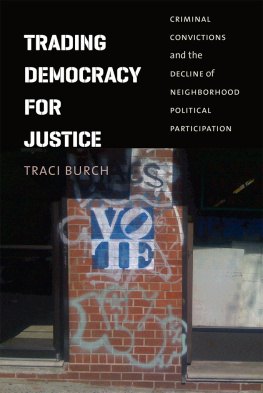

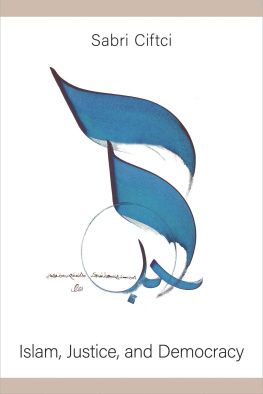
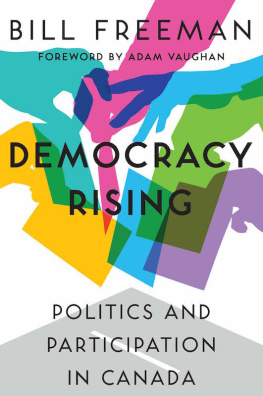
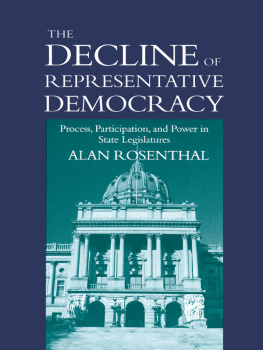
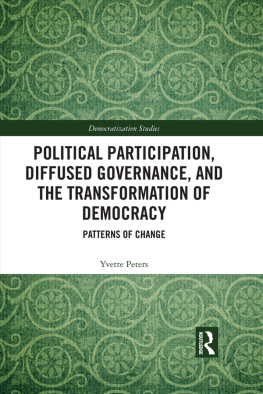

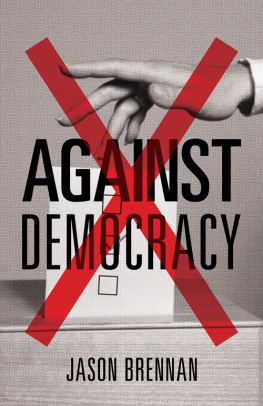

 This paper meets the requirements of ANSI/NISO Z39.48-1992 (Permanence of Paper).
This paper meets the requirements of ANSI/NISO Z39.48-1992 (Permanence of Paper).